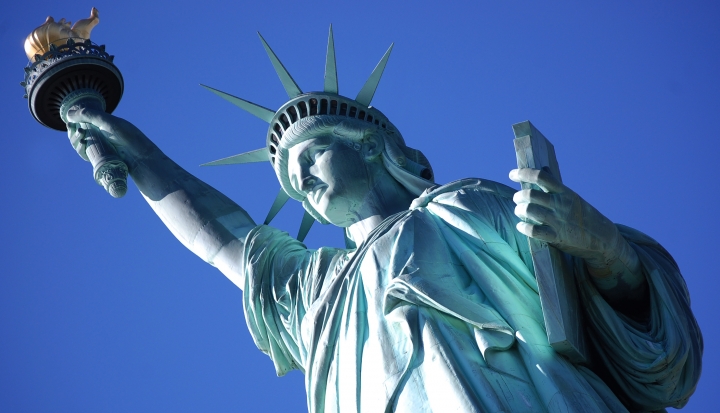The nuns are halfway through their cross-country bus tour that started in New Haven, Connecticut and will end in San Francisco, California. Their message from this time around is focused on what they call "commonsense immigration reform." This includes measures like protecting the rights of immigrant workers, ensuring family unity, and includes a "clear and direct path to citizenship for the 11 million people who are undocumented in the U.S."
The Nuns on the Bus are not the only Catholics who are calling for comprehensive and just immigration reform. In New Jersey, Bishop Paul G. Bootkoski with the Catholic Bishops of New Jersey has called for Catholics to support immigration reform. On Wednesday evening, about 400 people gathered for a bilingual (Spanish/English) Mass, offered as "a sign of unity and hope." The USCCB, too, has made a call for comprehensive immigration reform that looks strikingly similar to that of the nuns, calling for a "more humane and just immigration in the U.S.". Cardinal Dolan himself has put pen to paper to bring some attention to the issue, calling for immigration reform as a response to a "fundamental humanitarian problem."
But while there may be hope in New Jersey, it seems to be in short supply in Washington. After the most recent national election, Republicans seemed to accept that they needed to pass some significant immigration reform, if only to win back the Latino/a vote, which Republicans lost by around 44 points last November. But the serious talks about a "path to citizenship" and actual reform are quickly devolving back to talks about stronger surveillance and enforcement at the border. Marco Rubio, the golden boy of the Republican party, who was leading the conservative discussion about immigration reform, has even started showing signs of waffling on the legislation if it does not include some rather Draconian security details. Republican Rep. Raul Labrador quit the so-called "Gang of Eight" after negotiations regarding immigrant access to health care.
The impasse in Washington hardly comes as a surprise. After all, this Congress has earned for itself a reputation. Consistently, we can all look at Congress (both sides) and give a report card that reads "doesn't play well with others." It would be funny if their refusal to talk in anything but sound bites worked like Monopoly money – fun to play with but lacking any real-world consequences. Unfortunately, though, the people in Washington are making decisions that have very real-world consequences for very real people.
In his statement in USA Today, Cardinal Dolan wrote: "In the end, immigration reform is about answers to some basic questions. How do we treat our brothers and sisters? Do we want to continue a system that keeps millions of people in a permanent underclass? Do we want to continue to separate a generation of children from their parents? Do we want to continue the American heritage of hospitality or not? We must do better."
If "immigration reform" ultimately boils down to "keeping immigrants out," then, as a nation and as a church, we are failing to live up to our calling to welcome the stranger among us. Stamped onto the Statue of Liberty are the words, "Give me your tired, your poor, Your huddled massed yearning to breathe free, The retched refuse of your teeming shore. Send these, the homeless tempest-tossed to me." Jesus, too, tells us, "for I was a stranger, and you welcomed me in… just as you did it to one of the least of these, you did it to me."
It is time for us to work collectively toward the goal of opening our hearts to welcome the strangers as brothers and sisters, rather than constantly trying to push them out.
Image: By Ludovic Bertron from New York City, Usa, via Wikimedia Commons cc









